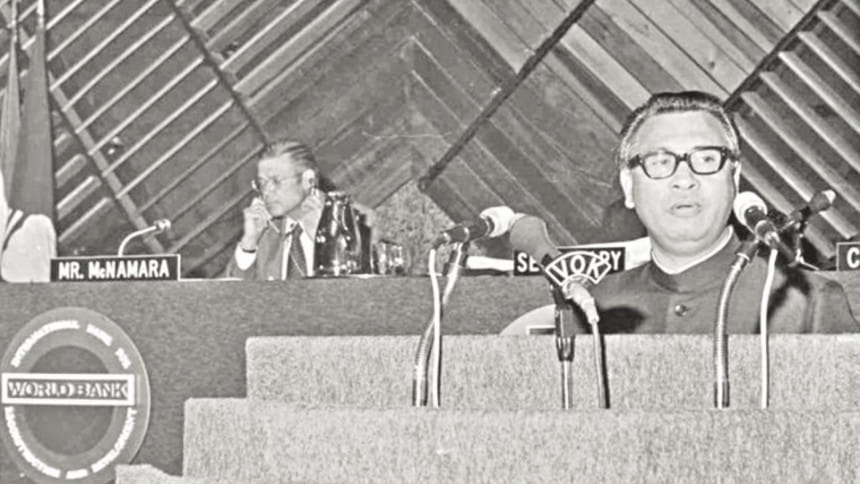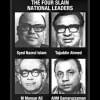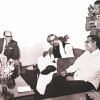Tajuddin Ahmad - The man with a golden heart

Tajuddin Ahmad took over as the finance and planning minister in Bangabandhu's first cabinet sworn in on January 11, 1972, and on the morning of January 12, I received an urgent summons from the prime minister to meet him when he conveyed his decision to appoint me as the finance secretary.
Prior to that, I did not have any occasion to meet Tajuddin. On January 17, before taking over my new assignment, I called on the finance minister at his Hare Road residence. As he came down the stairs, I introduced myself and explained that I had come to seek his guidance and advice on some of the urgent problems that required his attention.
Tajuddin was an out-and-out politician but distanced himself from politics when it came to administrative decisions. He gave his officers, especially me, a large measure of freedom of action, but was quick to react and rescind any order if he considered it inexpedient and inappropriate. During the two years that I worked with him, there were ups and downs in our relationship, but finally when I left the ministry, I departed with a high regard and respect for the man who truly had a golden heart.
Tajuddin wrote excellent Bangla and had beautiful handwriting. He was also an artist of sorts. He took great interest in the design of the Bangladeshi currency notes and took pains to improve on the design of each and every currency note printed during that period. The taka symbol of "t" was his work of art.
"Knowing the prime minister and his understanding of the concept of accountability of a public servant as I did, I had no doubt in my mind that this one telephone call from Tajuddin would have finished the career of the anti-corruption chief who perhaps did not realise that he owed his survival to the magnanimity of Tajuddin.
The finance minister's task was made more difficult by the fact that he held concurrent charge of both finance and planning - the two ministries that did not see eye to eye on certain policy and administrative issues. The finance minister had to strike a balance between his two roles and, often, between the two divergent views. It was a simple matter for the finance minister to overrule the views of the finance secretary and bring the dispute to an end. But he scrupulously avoided that situation and came to terms with the fact that the finance ministry should be allowed to express its views freely and openly even if it ran counter to his own views as a planning minister.
Tajuddin was far from a hardliner when it came to seeking development assistance from the West, as some people depicted him to be. Immediately after McNamara's whirlwind half-day trip to Bangladesh in January 1972, the finance minister instructed me to process our application for the membership of IMF and World Bank. It was a long-drawn procedure that called for membership of IMF first before one could apply for membership of the Bank. Many a time, he made anxious inquiries about the progress of work and as soon as the membership of IMF and World Bank came through, in June or July 1972, he was nominated by the prime minister as the Governor of IMF from Bangladesh, which was in time for him to attend the Annual Meeting of the World Bank and the IMF in Washington in September1972.
In Washington, the high point of the visit by the finance minister was his meeting with McNamara who had some misgiving about Tajuddin's attitude towards World Bank's assistance. The open and pragmatic approach of Tajuddin took McNamara by surprise and one could not but notice the joy in McNamara's face that his first encounter with Tajuddin went off very well.
By the time we went to Washington in September 1972, our foreign exchange reserve had soared to around USD 400 million from zero in January of the same year. With dollar dominating the world currency market, it was considered a princely sum and a comfortable reserve. We were, therefore, debating whether to accept the IMF offer to extend to Bangladesh the export short-fall adjustment credit (or perhaps it had a different name) routinely given to a newly emerging developing country to tide over the initial shortfall in its export earnings. Tajuddin quickly ended the debate by deciding to accept the IMF offer, which had no strings attached.
What endeared him most to us was his human quality. During our stay in London in connection with the Commonwealth finance ministers' meeting, the managing director of Janata Bank, Khairul Kabir, approached me with a request to allow Janata Bank to undertake a study of the problems and prospects of remittances by the Bangladeshis in UK, which was a good source of foreign exchange earnings for Bangladesh. Simultaneously, he proposed the name of Mumtaz Iqbal, chief of ICB, for the job. I knew Iqbal was at that time in London for the treatment of his ailing wife. I gave my assent to the proposal on condition that the finance minister also approved it.
As we all assembled at the Peacock Lounge of the London Airport for our trip to Washington, upon conclusion of the Commonwealth finance ministers' meeting, and were preparing to board the PANAM all-first-class passenger flight, Khairul Kabir hurriedly came to me asking for my approval on an application he had prepared proposing appointment of Iqbal for undertaking the study. On being assured that he had taken Tajuddin's verbal approval, I, in my usual fashion, wrote on the margin of the application: Discussed with the finance minister. As decided by him, USD 500 was sanctioned for the study by Mumtaz Iqbal. In the plane I mentioned this to the minister and he nodded his head in agreement.
Two years later, in 1974, when Tajuddin went to Washington to attend his last Bank-Fund Annual Meet, I was posted in the World Bank. In his hotel suite he greeted me with his usual warmth and suddenly, out of context, said that in Dhaka, which I left a year ago, I must have left behind a number of good friends. I could not understand this oblique reference, but what followed was beyond belief. He said that the same piece of paper on which I had approved appointment of Iqbal on a remuneration of USD 500 for undertaking a study of remittances from UK, and about which I took his approval on the plane journey to Washington, was brought in by the chief of the anti-corruption department in Dhaka seeking the minister's permission to prosecute me on the ground that I had made a false statement there in invoking his name to benefit a friend whereas no such discussion took place with the minister nor did he approve the proposed appointment.
Dumbfounded, I was waiting to hear what he did next. Tajuddin continued that in a rage he threw the anti-corruption chief out of his room with a stern warning that unless the case is dropped forthwith he would call the prime minister to suspend the chief on charges of misuse of power. Knowing the prime minister and his understanding of the concept of accountability of a public servant as I did, I had no doubt in my mind that this one telephone call from Tajuddin would have finished the career of the anti-corruption chief who perhaps did not realise that he owed his survival to the magnanimity of Tajuddin. As I was driving home that night alone and recalled the story, I shuddered and thanked God that Tajuddin was my minister.
I was in Washington when the news about the jail killing unfolded. On the 92nd anniversary of his birth, I am recounting some of the events of my two years with Tajuddin in the hope that this will revive memories of this near-forgotten hero of the liberation struggle.
M Matiul Islam is the first finance secretary of Bangladesh. This is an abridged version of an article published earlier by The Daily Star.









Comments